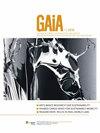Monitoring the Sustainable Development Goals in cities: Potentials and pitfalls of using smart city data
IF 1.9
4区 社会学
Q4 ENVIRONMENTAL SCIENCES
Gaia-Ecological Perspectives for Science and Society
Pub Date : 2023-03-13
DOI:10.14512/gaia.32.s1.8
引用次数: 2
Abstract
Smart city strategies highlight the potential to generate new type of data through new technology, for example crowdsourced data. Based on an empirical study, we show the potentials and limits of using new data for monitoring urban sustainability and especially the Sustainable Development Goals.The latest debate on smart cities and sustainability is underpinned by the United Nations’ 2030 Agenda and their accompanying Sustainable Development Goals (SDGs), which place urban data and monitoring systems at the forefront. Therefore, there is a strong need to assess the data-driven capabilities that will help achieve the SDGs. To fill the capability gaps between existing tools and SDG indicators, new smart city data sources are now available. However, scant indicators and assessment criteria have been empirically validated. This paper identifies some of the challenges alongside the potential of using new local data in urban monitoring systems. A case study of an SDG monitoring platform implementation in a district of Berlin is examined, and the results show that the use of locale-specific, and unofficial data not only improves data availability, but it also encourages local public participation. Based on our empirical findings, we determine that the incorporation of new data for urban sustainability monitoring should be treated as a complex social process.监测城市可持续发展目标:使用智能城市数据的潜力和陷阱
智能城市战略强调了通过新技术生成新型数据的潜力,例如众包数据。基于一项实证研究,我们展示了使用新数据监测城市可持续性,特别是可持续发展目标的潜力和局限性。关于智能城市和可持续性的最新辩论以联合国2030年议程及其伴随的可持续发展目标为基础,这些目标将城市数据和监测系统置于首位。因此,迫切需要评估有助于实现可持续发展目标的数据驱动能力。为了填补现有工具和可持续发展目标指标之间的能力差距,现在可以使用新的智能城市数据源。然而,很少有指标和评估标准得到实证验证。本文确定了一些挑战以及在城市监测系统中使用新的本地数据的潜力。通过对柏林一个地区SDG监测平台实施的案例研究,结果表明,使用特定地区的非官方数据不仅提高了数据的可用性,而且鼓励了当地公众的参与。根据我们的实证研究结果,我们确定将新数据纳入城市可持续性监测应视为一个复杂的社会过程。
本文章由计算机程序翻译,如有差异,请以英文原文为准。
求助全文
约1分钟内获得全文
求助全文
来源期刊

Gaia-Ecological Perspectives for Science and Society
ENVIRONMENTAL SCIENCES-
CiteScore
2.30
自引率
18.80%
发文量
43
审稿时长
>12 weeks
期刊介绍:
GAIA is a peer-reviewed inter- and transdisciplinary journal for scientists and other interested parties concerned with the causes and analyses of environmental and sustainability problems and their solutions.
Environmental problems cannot be solved by one academic discipline. The complex natures of these problems require cooperation across disciplinary boundaries. Since 1991, GAIA has offered a well-balanced and practice-oriented forum for transdisciplinary research. GAIA offers first-hand information on state of the art environmental research and on current solutions to environmental problems. Well-known editors, advisors, and authors work to ensure the high quality of the contributions found in GAIA and a unique transdisciplinary dialogue – in a comprehensible style.
 求助内容:
求助内容: 应助结果提醒方式:
应助结果提醒方式:


